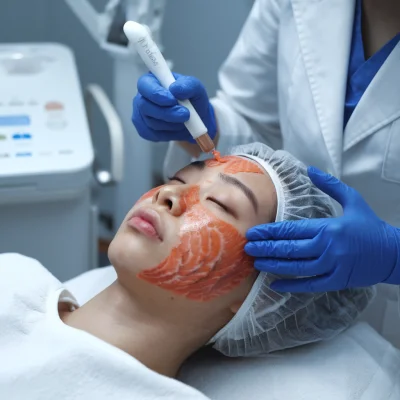The field of aesthetic nursing is rapidly growing. It's a specialty that combines medical knowledge with an artistic touch.
But what is an aesthetic nurse exactly, and what responsibilities do they have? They are registered nurses who specialize in cosmetic and dermatological treatments. These treatments can range from injectables like Botox to laser treatments and skin rejuvenation procedures.
While aesthetic procedures are elective, they still require strong judgment, a complete understanding of anatomy, and the ability to recognize contraindications and complications. This balance of safety and artistry distinguishes aesthetic nursing from other nursing specialties.
Becoming an aesthetic nurse requires specific training and certification. This is in addition to the standard nursing education and licensure.
This article will guide you through the role of an aesthetic nurse. It will explain the educational pathways, certifications, and training programs available. Whether you're a registered nurse looking to specialize or you're considering a career change, this guide is for you.
By the end, you'll have a comprehensive understanding of the aesthetic nursing field. You'll know what it takes to become an aesthetic nurse and the opportunities that await in this exciting profession.
Understanding the Aesthetic Nurse Profession
An aesthetic nurse blends the skills of healthcare with the world of beauty. This role requires both precision and creativity. Aesthetic nurses perform a range of procedures aimed at enhancing their clients' appearance. These procedures include administering injectables, assisting in minor surgeries, and providing pre- and post-operative care.
In addition to hands-on procedures, aesthetic nurses must be skilled observers and communicators. Evaluating skin health, facial structure, and patient goals requires careful attention to detail, as well as the ability to explain complex medical concepts in an approachable way.
In many cases, an aesthetic nurse acts as a consultant. They guide patients on suitable treatments, assess skin conditions, and develop tailored care plans. Moreover, they work under the supervision of dermatologists or plastic surgeons in clinics and spas.
Aesthetic nursing requires continual learning. It involves staying abreast of the latest trends and technologies in cosmetic treatments. Because aesthetic medicine evolves rapidly, nurses in this field often pursue further educational opportunities like Empire Medical’s Botox training course. New injectable products and therapies regularly enter the market, making ongoing training essential.
Key Responsibilities of Aesthetic Nurses:
-
Administering Botox and dermal fillers.
-
Conducting skin assessments.
-
Performing laser treatments and chemical peels.
-
Offering skincare guidance and recommendations.
-
Providing post-treatment care and patient education.
Aesthetic nurses play a crucial role in the cosmetic and dermatological industry. Their skills and knowledge are vital for delivering safe and effective care.
What Does an Aesthetic Nurse Do?
The role of an aesthetic nurse includes administering injectables like Botox and dermal fillers. They also perform skin treatments such as chemical peels and microdermabrasion. Beyond procedures, aesthetic nurses provide guidance on skincare and advise on follow-up care.
Patient safety is paramount. Aesthetic nurses must identify potential complications and address them promptly. Patient education often begins before any treatment is performed. Aesthetic nurses help patients understand realistic outcomes, possible side effects, recovery timelines, and how lifestyle factors can influence results.
Documentation is especially important in aesthetic practice. Accurate charting of products used, injection sites, dosages, patient responses and health history helps ensure continuity of care and protects the patient and provider.
Additionally, aesthetic nurses work closely with other professionals. Their collaboration ensures comprehensive care and optimal patient results.
The Growing Demand for Aesthetic Nurses
The demand for aesthetic nurses has surged in recent years, as a rising interest in non-surgical cosmetic treatments continues to drive this growth. Advancements in technology have made aesthetic procedures safer and more accessible. This accessibility fuels patient interest and industry demand.
Non-invasive and minimally invasive treatments appeal to patients seeking noticeable results with less downtime. As these options expand, healthcare practices increasingly rely on trained aesthetic nurses to meet patient demand while maintaining clinical standards.
Aesthetic nurses bridge the gap between medical and cosmetic services. They bring a level of expertise and assurance to these procedures. The combination of medical knowledge and artistic skill sets them apart and equips them to deliver personalized aesthetic solutions effectively.
Educational Pathways to Becoming an Aesthetic Nurse
When understanding how to become an aesthetic nurse, understand that the process involves a structured educational journey. It begins with obtaining a degree in nursing from a cosmetic nursing school.
Most aspiring aesthetic nurses first pursue a Bachelor of Science in Nursing (BSN). This degree provides a comprehensive foundation in medical and patient care. After earning a degree, candidates must obtain a registered nurse (RN) license. This requires passing the NCLEX-RN exam.
Clinical experience is crucial. Many nurses work in general or specialized settings to gain practical skills. Once foundational experience is established, nurses often pursue targeted workshops or cosmetic-focused programs. Empire Medical Training offers both aesthetic workshops and comprehensive guidance on how to become an aesthetic nurse.
Hands-on aesthetic training helps nurses translate their foundational clinical knowledge into cosmetic applications. This phase of education focuses heavily on facial anatomy, injection techniques, patient assessment, and complication management.
Steps to Become an Aesthetic Nurse:
-
Obtain a Bachelor of Science in Nursing (BSN).
-
Pass the NCLEX-RN to become a licensed RN.
-
Gain clinical experience in a medical setting.
-
Pursue specialized aesthetic training and certifications.
-
Network with professionals and join relevant organizations.
Master's Programs and Advanced Certifications
Some aesthetic nurses choose to pursue advanced education. A Master’s in Nursing with a focus on aesthetics can enhance one’s expertise and opportunities. Advanced education may be especially beneficial for nurses interested in leadership, teaching, or expanded clinical responsibilities within aesthetic practices.
Master’s programs offer in-depth training in advanced medical aesthetics. They cover subjects like advanced injectables, skincare technologies, and cosmetic dermatology. These programs often include clinical practicum components.
Advanced certifications can also boost one’s career. Certifications like the Certified Aesthetic Nurse Specialist (CANS) demonstrate specialized competence. Certifications require additional training and passing of specific examinations, and they signal a commitment to maintaining high standards in aesthetic nursing.
Master’s degrees and certifications not only increase expertise. They also open opportunities for leadership roles in the field.
Specialized Roles within Aesthetic Nursing
The field of aesthetic nursing offers numerous specialized roles, each focusing on different aspects of cosmetic care. These roles allow nurses to fine-tune their skills and cater to their specific interests in aesthetics.
One key role is that of the injection nurse. Injection nurses specialize in administering injectables, such as Botox and fillers, to enhance facial aesthetics.
Aesthetic nurse practitioners have advanced training and play a pivotal role in patient care. They often perform comprehensive assessments and develop personalized treatment plans.
In addition to injection techniques, aesthetic nurses may specialize in laser therapies and other non-invasive procedures. This diversity in roles allows for career growth and specialization.
Specialized Roles Include:
-
Injection Nurse (Botox, fillers)
-
Laser Therapy Specialist
-
Skin Care Treatment Expert
-
Aesthetic Nurse Practitioner
By exploring specialized roles, aesthetic nurses can align their careers with their interests and contribute significantly to patient outcomes and satisfaction. Specialized training and certifications provide the edge needed to excel in these roles.
Injection Nurse and Nurse Injector
An injection nurse specializes in injectable aesthetics. They are skilled in administering neurotoxins like Botox and dermal fillers for cosmetic enhancement.
This role demands precision and an understanding of facial anatomy. It ensures injectables are both safe and effective. Injection nurses must also develop a strong aesthetic eye. Small adjustments in placement or dosage can significantly impact outcomes, making experience a critical component of development.
Nurse injectors must complete specialized training programs. These programs focus on injection techniques, patient safety, and managing potential complications. Complication management is a key area of education. While most injectable treatments are low risk when performed correctly, injection nurses must be prepared to recognize early warning signs of vascular occlusion, asymmetry, infection, or adverse reactions and respond appropriately.
Aesthetic Nurse Practitioner Programs
Aesthetic nurse practitioners are at the forefront of cosmetic care. They combine advanced nursing skills with aesthetic expertise to deliver comprehensive care.
In many practices, aesthetic nurse practitioners take on expanded responsibilities beyond procedural work. These may include overseeing treatment protocols, evaluating patient eligibility for advanced procedures, and collaborating closely with physicians on complex cases.
These practitioners typically complete advanced programs focusing on medical aesthetics. The curriculum includes advanced skin care, cosmetic dermatology, and patient assessment.
Programs often incorporate clinical internships. These provide real-world experience under supervision, fostering competence in aesthetic treatments. Clinical training at this level emphasizes independent decision-making, patient safety, and long-term treatment planning.
Graduates of aesthetic nurse practitioner programs can work in diverse settings. They often operate in private practices, dermatology clinics, or medical spas.
Certification and Training for Aesthetic Nurses
Becoming a certified aesthetic nurse involves rigorous training. The journey ensures nurses are well-prepared for the diverse treatments they will deliver.
Certification provides formal acknowledgment of a nurse's competency in aesthetic procedures. It opens doors to more specialized roles and enhances professional credibility. Many employers and supervising physicians prefer or require certified nurses because it demonstrates consistency and adherence to best practices.
Several certification options are available, such as the Certified Aesthetic Nurse Specialist (CANS) designation. Each comes with specific prerequisites and assessment criteria. Hands-on training also plays a critical role in developing the expertise required in this field.
Training programs often cover a wide range of procedures, including injectables, laser therapies, and skin rejuvenation techniques.
Aesthetic Nurse Certification Process
Obtaining certification as an aesthetic nurse is a multi-step process. It typically begins with gaining some experience in clinical settings to build a solid nursing foundation. Clinical experience in areas such as dermatology, plastic surgery, or medical spas can be especially beneficial in many cases.
Candidates must meet set requirements, including having a valid RN license. They may also need to complete specific coursework or training hours related to aesthetics. The certification process often involves passing an exam. This assesses the nurse’s knowledge of aesthetic principles and practical skills in administering treatments.
Hands-On Injector Training and Mentorship
Hands-on injector training is a crucial component of aesthetic nurse education. It enables nurses to apply theoretical knowledge and refine their practical skills. Live patient training offers exposure to variations in anatomy, skin quality, and patient expectations that cannot be fully replicated simply through simulations.
Mentorship is invaluable. Experienced mentors provide guidance and feedback, allowing nurses to build expertise in a supportive environment.
Legal and Ethical Considerations in Aesthetic Nursing
Aesthetic nursing involves complying with various legal regulations. These rules ensure safe and ethical practice within the field.
Because aesthetic medicine sits between healthcare and elective treatment, legal accountability is critical. Nurses must balance patient requests with treatments that are medically necessary, ensuring the care remains within professional and legal boundaries. Nurses must be aware of the specific regulations in their state. This knowledge is key to practicing within the scope allowed by law.
Ethics play a crucial role in aesthetic nursing. Maintaining patient safety and upholding moral standards are fundamental responsibilities. Ethical decision-making often includes knowing when to decline treatment. Patients may request procedures that are excessive or inappropriate, and aesthetic nurses are responsible for guiding decisions that prioritize long-term well-being over short-term results.
Adhering to these considerations not only protects patients but also enhances the nurse’s professional reputation. Legal and ethical compliance is integral to successful practice.
Career Advancement and Opportunities for Aesthetic Nurses
Aesthetic nursing offers diverse career paths and advancement opportunities. Nurses can specialize in various areas or climb managerial ladders.
As nurses gain experience, many transition into senior injector roles, clinical educators, or practice leaders responsible for training staff and overseeing protocols. These positions allow seasoned nurses to influence standards of care and can also lead to increases in salary.
Obtaining additional certifications can significantly boost career prospects. Advanced training helps nurses specialize in niche areas like laser therapy.
Mentorship also plays a vital role in career growth. Guidance from experienced professionals can open doors to new opportunities.
Continuing Education and Professional Development
Continuing education is vital in aesthetic nursing. The field evolves rapidly with new technologies and techniques emerging frequently. New injectable formulations, devices, and treatment protocols require ongoing education to ensure safe and effective application.
Staying current with advancements ensures high-quality patient care. Nurses must regularly update their knowledge to remain effective.
Participating in training workshops and courses is beneficial. These programs offer hands-on experience and exposure to cutting-edge practices.
Importance of Lifelong Learning in Aesthetic Nursing
Lifelong learning is more than a requirement; it's a necessity. It enables nurses to adapt to industry changes efficiently.
Engaging in ongoing education bolsters clinical expertise and skill development. It provides competitive advantages in an ever-changing job market.
Additionally, lifelong learning promotes personal growth and job satisfaction. Staying engaged with new knowledge keeps nurses motivated and inspired.
Networking and Professional Organizations
Networking is a crucial component for aesthetic nurses. It fosters connections with peers and industry leaders, providing invaluable insights.
Joining professional organizations offers access to resources and support. Membership often includes educational opportunities and career guidance. Professional relationships may lead to mentorship, job referrals, and collaborative learning opportunities.
Active participation in these groups strengthens professional identity. It fosters a sense of community and shared purpose among nurses. Collaboration through networking can also lead to career advancements and partnerships.
Become a Certified Aesthetic Nurse with Empire
Aesthetic nursing offers diverse and rewarding career paths. It blends healthcare with beauty, allowing nurses to enhance patient confidence. As the field grows, opportunities and the need for skilled professionals expand. Pursuing this career can be fulfilling both professionally and personally. Stay committed to learning and embrace the dynamic nature of aesthetic nursing.
Success in aesthetic nursing depends on a commitment to education, ethical practice, and continuous skill development. With the right foundation, aesthetic nursing provides a unique opportunity to combine clinical expertise with creativity, making a meaningful impact on patients while also creating a long-term career you can be proud of.





